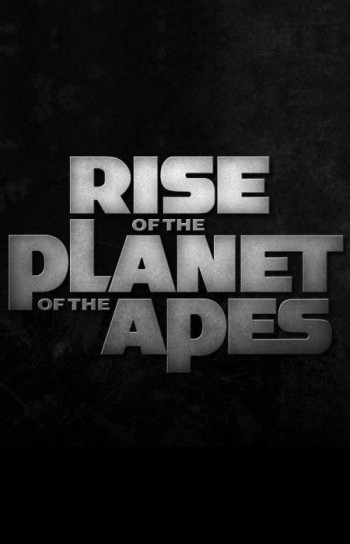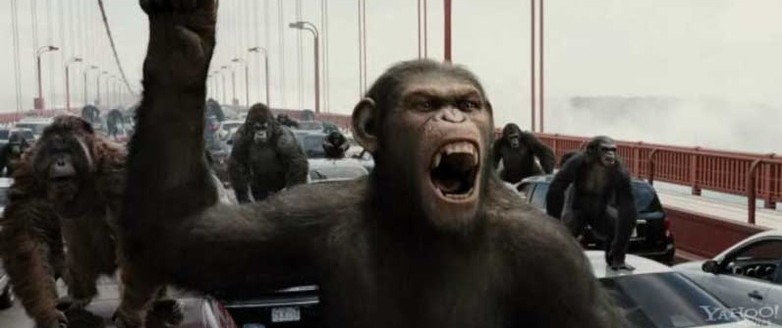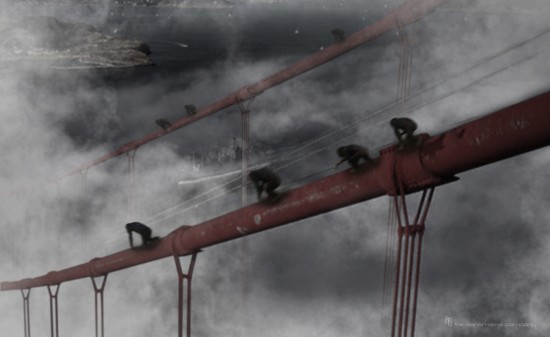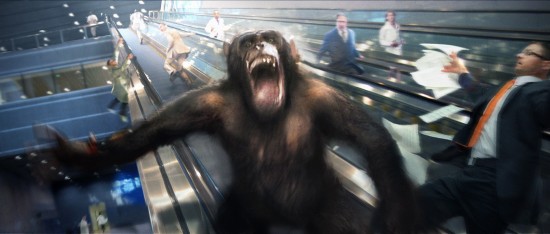You Maniacs! You Actually Made Rise of the Planet of the Apes into a Good Movie!
 Rise of the Planet of the Apes (2011)
Rise of the Planet of the Apes (2011)
Directed by Rupert Wyatt. Starring Andy Serkis, James Franco, John Lithgow, Brian Cox, Freida Pinko.
This one may take me a while to process.
At the moment, I know that Rise of the Planet of the Apes is a good movie. Dramatic, exciting, technically marvelous, intelligent. But I need more time to figure out if it is a great movie. I don’t mean over a couple of weeks, or even months. This film may require years before I can grasp how it stands in the science-fiction world. It feels possible that Rise of the Planet of the Apes will achieve the status of a movie that people watch over and over again on whatever the top home video device of the day will be, and which will sell perennially in each new “Special Edition” released. Or, it might become a modest good memory, a film people return to occasionally but don’t think about much beyond saying, “That ‘Apes reboot thingy’ was a sort of cool flick. Hey, let’s watch Inception again!”
Rise of the Planet of the Apes is a movie that is either good or great, and I won’t feel comfortable placing a ten-dollar chip on either square at the moment. I only know that I enjoyed it more than anything else this summer, fannish Captain America love excepted.
Early news about the upcoming “New Apes” film was sketchy about what exactly it would be and how it would sit with the continuity of anything produced in the franchise before — which was quite a mess already. What ends up on screen is a reboot establishing a new series, but is also a re-make of 1972’s Conquest of the Planet of the Apes, the fourth installment in the original series and the best film after the original. In Conquest, an intelligent chimpanzee named Caesar leads an uprising of his oppressed kind against their human masters, and that rough outlines serves as the blue-print for Rise of the Planet of the Apes. The filmmakers made a cagy choice to use Conquest as the new origin point, since it marks the best place to jump into a new movie series without having to go Tim Burton’s route and simply re-do the first movie and miss its point entirely.
Rise (or ROTPOTA, if you’re acronym addicted, which I am not) uses a realistic, slight futurism for its setting. In this not-too-distant future, a genetics company in San Francisco starts testing a retrovirus called ALZ-112 on chimpanzees to see if it will cure Alzheimer’s Disease. The main scientist on the project, Will Rodman (James Franco), has a personal investment in finding a cure, since his father (John Lithgow) is heading into the advanced stages of the disease. ALZ-112 appears to be working so well on its chimpanzee subjects, in particular a female named “Bright Eyes” (yes, indeed), that the evidence suggests the retrovirus can move past brain cell repair and into the enhancement of intelligence.
However, a disastrous failure in front of the company’s board members—involving a lot of shattered glass—throws the project into the medical waste bin. Against Rodman’s appeal, the company puts down all of the simian subjects.
But Rodman ends up in the possession of the chimpanzee infant of one of the most successful test subjects. He secretly takes the chimp home, where his father gives the little ape the name “Caesar.” Caesar grows up in the Rodmans’ house, and starts to exhibit high functioning activity that indicates that the benefits of ALZ-112 are passed down genetically. Rodman goes so far as to test the retrovirus on his father to see if it works on humans.
At this point, Rise of the Planet of the Apes dips into two classic science-fiction themes: the “Frankenstein” tale of humanity toying with science and facing the consequences of hubris/ignorance; and the rebellion of an oppressed “alien” minority. The film doesn’t bring vast new ideas to these tropes, but it respects their history and the intelligence of viewers who want a bit more than super apes beating people up. The heavier themes of Planet of the Apes are not present, but the movie has enough on its mind to score a high Summer Movie IQ.

If you had told me a year ago that the upcoming re-boot/re-make/re-mix of Planet of the Apes would not only not suck, but thrill me with the idea of a whole new series, I would have told you to get your stinking paws off me. Come on, you saw that Tim Burton splat-ball that smacked Franklin J. Schaffner’s 1968 classic in the face with its utter vapidity, right? “Apes” is done as a franchise, my friend.
Yet, damn . . . this is good. This is smart. It is a perfect “August surprise” movie, like District 9 was in 2009. However this movie stands in ten years, right now it is one of the Summer of 2011’s best pieces of popular film entertainment.
Obligatory Franchise Background Blather: Few films seem less likely to have spawned a successful franchise than the 1968 Planet of the Apes. Based on Pierre Boulle’s 1963 novel Le Planète des Singes, the film adaptation is cerebral, allegorical science fiction, and its famous twist finale stamps “The End” on it with shrieking, sand-pounding force. Really, where else could the filmmakers go after this? When a Twentieth Century Fox executive told Associate Producer Mort Abrahams that he should do a sequel, he recalls answering: “You’ve got to be kidding? How?”
And yet, they found a way: four live-action sequels followed in rapid succession, plus two television shows, a ream of comic book titles . . . and by the end of the ‘70s I had a Planet of the Apes lunchbox in second grade. Welcoming to the New Merchandizing. It’s a madhouse! A madhouse!
Appropriately, the franchise that the 1968 movie spawned is a fully bizarre one. The quality of its four sequels ranges, but all of them are least interesting in some fashion. I can sit down and enjoy the last and least of the first series, Battle for the Planet of the Apes (1973), almost any time. It was financed with change found in the lint catcher of producer Arthur P. Jacob’s drier and has a TV-movie quality to it, but it also boasts Paul Williams in orangutan make-up, and that’s worth something. (If you’ve never seen this Tonight Show clip, prepare to have your rainy day get a bit brighter.)
And after a ten-year break, the damn dirty apes are back — and they are the stars again. The hero of Rise of the Planet of the Apes is the hyper-intelligent chimp Caesar, and everything you might have heard about the special effects that mix Weta CGI with a motion capture performance from Andy Serkis is true. This is the next generation in mo-cap after the advances in Avatar, with extensive shooting on location instead of inside blue-walled studios. Caesar and the other apes of the film that benefit from the boost of ALZ-112 and its successor ALZ-113 are fully developed characters that demand audience attention and emotional connection—and get it. The apes don’t look exactly “photorealistic,” but that helps remind viewers that these are not true apes, but an evolutionary advancement on them. No real ape got near the set of the movie, and at times it is hard to believe it — except that you know that no trainer could get actual apes to wreck the havoc we see.
 The human folks — a supporting cast in the truest sense — fare better than most critics have been willing to grant. I have no problem with James Franco’s performance, although the original choice of Tobey Maguire might have turned out better. (Negotiations with Maguire broke down, so the casting director looked at the next actor on the Spider-Man roster.) Franco connects well with Serkis’s Caesar, and also with John Lithgow as his declining father. Franco comes across much wobblier with his love interest, primatologist Caroline Aranha (Freida Pinko), who hangs around so Franco can talk to someone else aside from his dad and the ape who uses sign language, but Caroline is the most disposable of the human cast. Once the ape mayhem begins, she might as well sign-off for lunch and hang around the craft services table.
The human folks — a supporting cast in the truest sense — fare better than most critics have been willing to grant. I have no problem with James Franco’s performance, although the original choice of Tobey Maguire might have turned out better. (Negotiations with Maguire broke down, so the casting director looked at the next actor on the Spider-Man roster.) Franco connects well with Serkis’s Caesar, and also with John Lithgow as his declining father. Franco comes across much wobblier with his love interest, primatologist Caroline Aranha (Freida Pinko), who hangs around so Franco can talk to someone else aside from his dad and the ape who uses sign language, but Caroline is the most disposable of the human cast. Once the ape mayhem begins, she might as well sign-off for lunch and hang around the craft services table.
One of the movie’s missteps is Draco Malfoy Tom Felton as Dodge Landon. (The name is overcooked fanservice, combining the last names of the two doomed astronauts along for the ride with Chuck Heston in Planet of the Apes.) Landon is a bully who mistreats the apes at a primate reserve where Caesar gets sent after an unfortunate public incident. And Landon is a very generic bully, written hardly past the stage of the requirement for a figure we want to apes to pummel until he bleeds from the ears when they break out of their cages. Trapped in the Landon-boat is Brian Cox as his father and the head of the preserve. Cox can bring a kind of misguided villainy to his parts, but Hank Landon is underutilized considering the man casting picked for the role.
Nonetheless, the humans can’t ruin the film; at the worst, they distract. The apes simply have more screen time and get the big heroics. If you consider that the apes are all mo-cap creations, that is an incredible chunk of face-time for this sort of technology. Director Rupert Wyatt, the Weta team, and the ape performers put in top-notch work for some of the best non-human heroes yet seen in a live-action movie.
Rise of the Planet of the Apes is not a typical action blockbuster. A few set-pieces appear scattered through the running time, but most of the spectacle comes from the creation of the apes as screen characters. By the time of the massive Golden Gate Bridge confrontation arrives, similar to the stand at the narrow bridge in Conquest of the Planet of the Apes (which is, by the way, two blocks from my apartment) audiences have witnessed the gradual rise of suspense and character drama that allow the movie to explode into a tremendous finale. This is an ape-pocalypse just like you want to see it.
An enormous amount of fanservice moments pepper the film. Some of them work, others seem as if the filmmakers felt they had to do it or fend off email inbox overload from complaints. The subtle nods work the best, such as the names of some of the apes. There’s a Statue of Liberty bit that is done on the periphery of the action that works since it doesn’t require stopping the scene. But the repeats of some of the famous Chuck Heston lines from Apes ’68 arrive with eye-rolls. However, the audience I saw it with loved the appearance of one the lines and cheered it; it falls at the right beat, but it still waves around the flag of the franchise too noticeably.
Great ape performances; special effects destined for this year’s Oscar; a well-constructed story with excellent pacing; corker of a finale. Mark those all off in the “plus column.” Average humans; pointless love interest; generic bad guy; dopey “wink” moments; customary plot-holes you find in blockbusters. Mark those off in the “negative column.” Total at the moment: Good movie. Total in the future: We shall see.
The credits have a glaring omission, one that Fox should consider changing for home video release. The name of writer Paul Dehn, who wrote the screenplay for Conquest of the Planet of the Apes, created the character of Caesar in the first place, and shaped the interesting direction that the first series took, appears nowhere in the end credits. I hope this came about through legal wrangling, and not through choice or ignorance, because this man deserves the kudos. Plus, he co-wrote the screenplay to Goldfinger, so he’s a great guy.
Warning: Do not get up and run for the door when the end credits start to pop onto the screen, no matter how badly you need to get to the restroom. Give it at least a minute, because there is an important scene imbedded within the credits and an animation design that are crucial to what the movie is doing. Stay put, you won’t regret it.
By the way, Hollywood. . . . After this near-perfect creation of CGI Apes, and with a certain film about some fellow named “Carter” coming out next year, you know what it is time to do. Yes, break out with the killer live-action, Burroughs-faithful Tarzan of the Apes! This must happen Hollywood, and you’ve already missed the chance to release it on the book’s hundredth anniversary. Get moving.

Caution: The following might be considered “spoilerish” as I speculate on the sequel. I’ll avoid details, but inferences are harder to avoid.
One of the exciting aspects of Rise of the Planet of the Apes for anyone who is an Ape-fan is how it positions itself for a sequel. And not just any sequel. Audience members unfamiliar with the arc of the first set of movies will also sense where the story is going, although without the same giddy recognition.
It seems that the next movie in the series will be Planet of the Apes. A re-make of the original. Two subplots that seem disconnected from the “ape bid for freedom” storyline, one of them very subtle, appear designed to establish a situation close to the plot of the 1968 movie. The end credits are the deal-closer, as far as I can tell.
Actually, the deal-closer is that Rise of the Planet of the Apes had a huge first weekend opening that outperformed box office predictions. Audiences seem to like the movie, and I think within a month Variety and Hollywood Reporter will run headlines that a second installment has started moving ahead. Twentieth Century Fox probably won’t mention the title yet. But I think that, oh, Planet of the Apes might be a good bet. . . .
Come what may, I’m ready to go ape. (I’m a maniac! I’m a maniac! I finally used that stupid pun! Ah, goddamn me! Goddamn me all to Hell!)
Ryan Harvey is a veteran blogger for Black Gate and an award-winning author. He received the Writers of the Future Award in 2011 for his short story “An Acolyte of Black Spires,” and has two stories forthcoming in Black Gate and a number of ebooks on the way. You can keep up with him at his website, www.RyanHarveyWriter.com and follow him on Twitter.
WARNING: SPOILERS BELOW…
Nice review, Ryan! I, too, was impressed with the new movie, or as I like to think of it, the Franchise Relaunch. And I’m an OLD-SCHOOL Apes fan. I enjoyed above all the emotional weight that held this movie together. If you didn’t feel so much for Ceasar as a real character, none of it would have worked. (Also have to say how brilliant and touching John Lithgow was as the Alzheimer’s dad–but Lithgow is always great).
My only complaint about this movie was its marketing–between all the trailers on tv, web, and in theatres, I really did see the WHOLE MOVIE before I ever set food in the theatre. It’s one of my pet peeves–marketing campaigns that save nothing for the movie-goer. So the marketing campaign stole most of the thunder for me, but even so I still enjoyed the movie.
I loved the nice little touches for the longtime Apes fans: “You damn dirty ape!” & “NO!!!” & the crew that blasts into space, etc.
I think reconfiguring the end-of-humanity from a nuclear catastrophe to a biological catastrophe is completely in keeping with the mood of the times. These days people are far more worried about biological agents and unstoppable viruses than nuclear holocaust. (Although the first could lead to the second.)
My big question going in was: “How are they going to set up the franchise–i.e. show the end of the world–without making it a total bummer for the new audience? Well, they pulled it off by minimizing the death of humanity and actually KILLING OFF THE HUMAN RACE DURING THE END-CREDITS!!! That was a ballsy movie but they made it work. It was also a nice touch how, when they show where all the planes were heading across the world (i.e. spreading the virus), they zeroed in on New York for a lingering moment. Since that’s where the action of the original PotA took place, it sets the stage nicely.
Needless to say, it’s also easier to “buy” a world destroyed by a virus than nuclear warfare because we know that nothing but cockroaches would survive a nuclear war. If that. And who wants to watch “Planet of the Cockroaches”?
Overall, I feel that same way about RISE that I feel about most comic book and sci-fi franchise relaunches: Good job, now show me something new and original in the second movie. Bring it on, Caesar!
> And who wants to watch “Planet of the Cockroaches”?
Actually, John, that sounds sort of interesting . . .
I think the “spoiling” of the film in marketing is something that’s sort of a problem with trailers today in general. I saw at least one trailer before Rise of the Planet of the Apes where I thought, “Wait a minute—why did you just tell me that? That sounds like the middle plot-twist of your film. Why did you tell me that?” I wish more filmmakers would take the route that Christopher Nolan and Warner Bros. took for promoting Inception, which kept the great moments hidden, as well as much of the plot, but still had you thrilled to see the movie.
Part of me wants them to do Beneath the Planet of the Apes next. They could just leave out the humans, and have it be Ape v. Mutant.
The longer I get to root for the Apes the better. I had no problem believing Draco Malfoy’s character. Sometimes people are just mean, petty and small. These are the same sorts of people who try to use a cattle prod to stop a fire hose.
This blog gets my vote for best title of the year.
I don’t understand the controversy with Planet of the apes from Burton, being for me Burton an overrated filmmaker and one of my less favourites, Planet of the apes, the less burtonesque os his works are the only film by him I like it, and it has Stella Warren on it
[…] The First Avenger) and also refreshed one of my favorite film series with a stunning new kick-off (Rise of the Planet of the Apes), I have plenty to feel thankful for. Other films I enjoyed: X-Men: First Class, Hobo with a […]